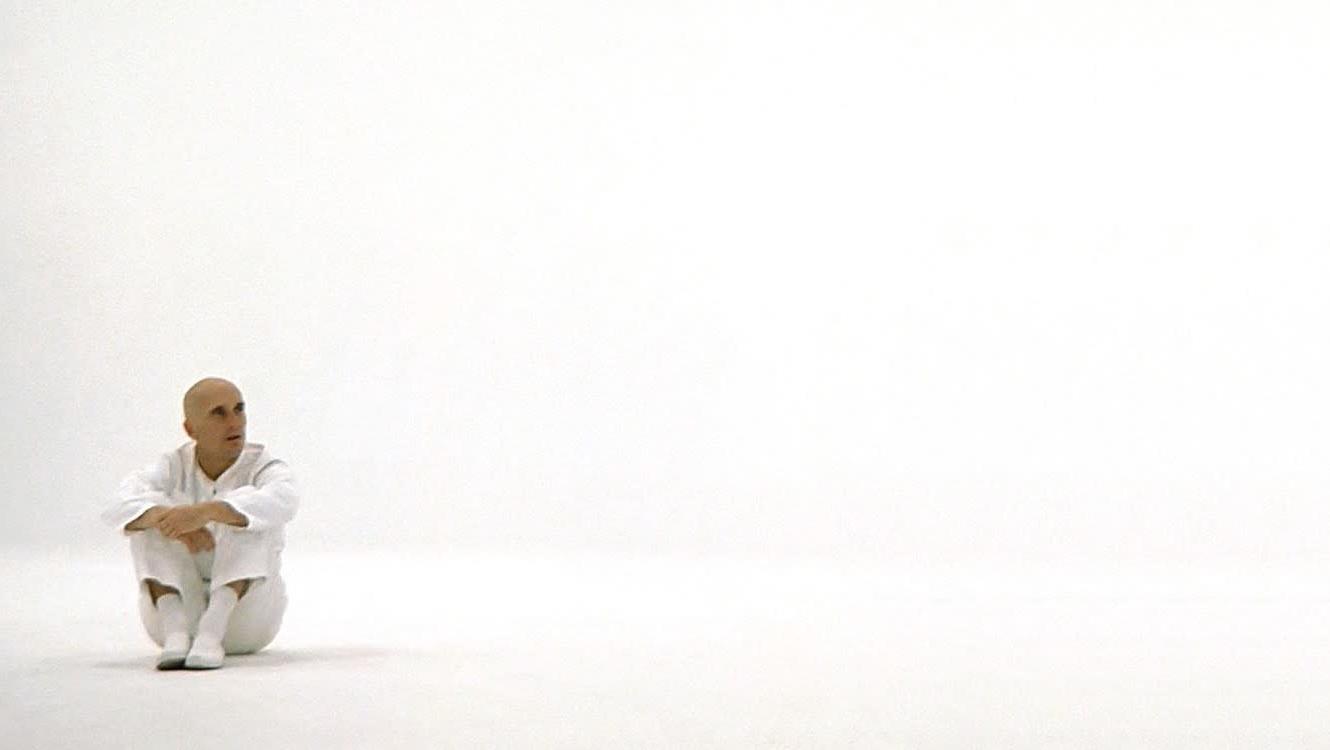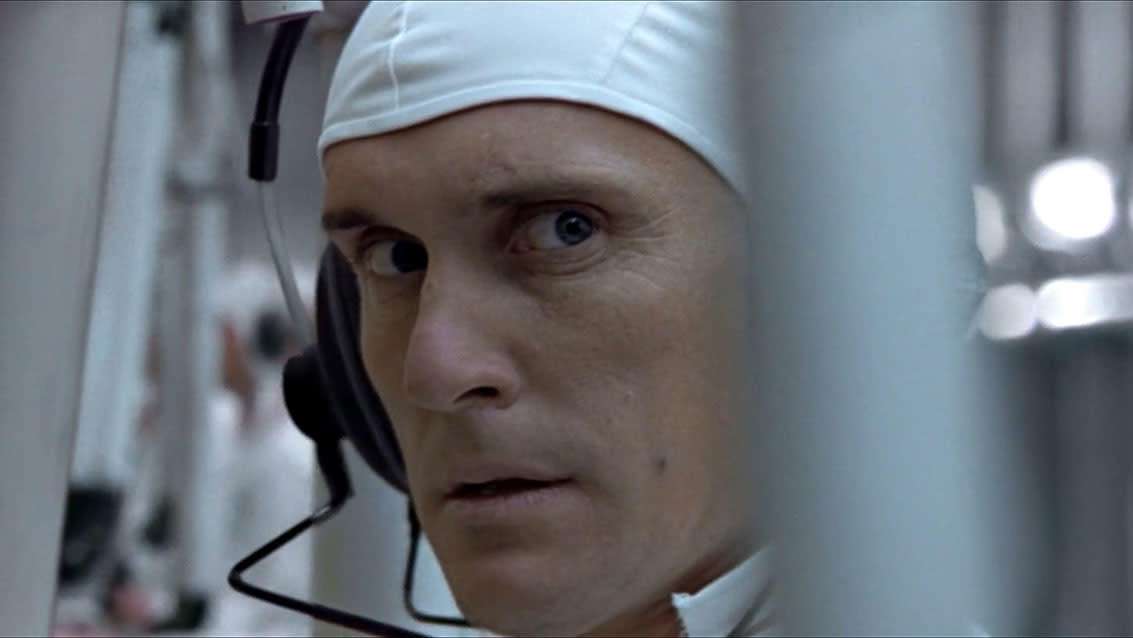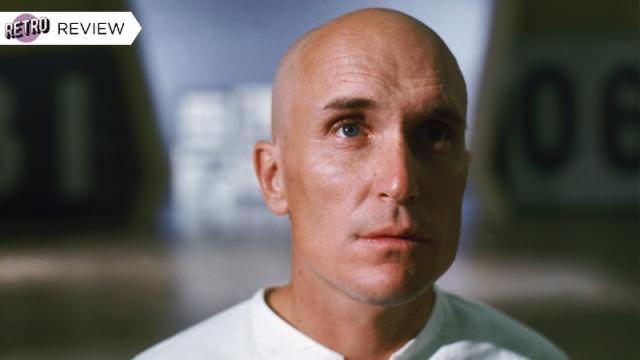Say the name George Lucas and people obviously think Star Wars. That tends to happen when you create one of the biggest film franchises of all time. But when Lucas himself thinks of his career, you have to suspect he thinks back to its origins. It all began with a dystopian sci-fi student film that became a feature that would launch a career that would change the world as we know it: THX 1138.
The film opened March 11, 1971 — which means it turns 50 this week — and if you’re looking to rewatch it, it’s currently available to stream on HBO Max. Robert Duvall leads the cast as the titular character, a man who lives in a repressive society where sexuality and most forms of expression are frowned upon. It’s only when his roommate, LUH 3417 (Maggie McOmie), secretly weans THX off his daily medication that they both begin to see things clearly, fall in love, get pregnant, and desperately try to escape this mysterious, terrifying, inhuman world.
I must admit that summary sounds much more exciting than the movie actually is. Watching THX 1138 50 years after its release is not exactly a rip-roarin’ good time. In 1971, Lucas was a filmmaker much more interested in artistry and subtlety than lightsabers and Death Stars. As such, the movie is methodically paced with the only real hints of action packed into the last act. It’s very much a film of its time in that way, made when audiences were a bit less accustomed to the movies Lucas and his friends like Steven Spielberg would begin to popularise later in the decade.
What the slow pacing does, however, is force a viewer to think. Since the story isn’t being shoved down your throat the whole time, there’s lots of time to just explore the frame and consider what’s happening. Why certain choices were made. What it all means. And here’s where Lucas seemed to be complicit in the gag.

You see, almost everything in THX 1138 is white. White clothing, white walls, white people with bald heads, showing off even more whiteness. The lack of colour in the film is staggering and the way it works is twofold. Of course, it hammers home how dire this drab, blank, sad world is, but white is also a colour that begs for colour and creation, for the viewer to fill in the nothingness. George Lucas’s choice to make white so prominent is almost his way to tell the audience, “This film is what you make of it, tell us what you think.”
In THX 1138, you have plenty of time to think.
After THX and LUH are separated, THX is put in prison which is, even more so than the world they live in every day, just a white void — there are no doors, no discernible markings, seemingly no up, down, or way out. Just the beds the prisoners sleep in and that’s it. This is why, when THX and SEN 5241 (played by Donald Pleasence) attempt escape, they’re so shocked to find a Black man in the void: a man named SRT (Don Pedro Colley). The problem being SRT doesn’t think he’s a man. He says he’s a hologram.
In fact, he’s a hologram actor. Earlier in the film, we see THX robo-masturbating to a hologram of a naked Black woman, and when he switches the channel, there are holograms of Black men too, some nude and others on some kind of talk show. The implication here being the fairly problematic (both on purpose but also in practice) idea that people of colour are mainly in this world for entertainment and pleasure. The fact that SRT actually thinks he’s a hologram suggests he doesn’t know he’s a person at all. So when THX and SEN meet SRT, they’re not just encountering the only “real” Black person in the movie, they’re encountering someone with a viewpoint, albeit it a very upsetting one, that’s different from their own. And it’s through SRT that THX and SEN find hope. He knows the way out of the void.

That whole meeting and everything that follows is a further escalation of Lucas letting the audience fill that blank void he’s created. Up until that point though, he’s already filled his entire world with dystopian riddles for you to unravel. Who started this world? What’s its end game? Where did the people come from? Why is it important they’re all complacent and medicated? Is everyone doing the same job? Lucas gives the audience everything to consider, very little certainty, and nothing is incorrect because he wants you to think what you think and feel what you feel. Heck, he even has a character literally leaving pieces of bread on the ground by mistake. He wants you to follow the breadcrumbs to your own interpretation.
You could go on and on listing the nuggets that Lucas invites you to consider. The fact that killing only 200 workers on the job is a win. That THX watches police brutality as a form of entertainment. How the faith figure in the film, OMM 0000, is obviously automated. Police giving up on their pursuit because the pursuit goes over budget. There’s just so much to dissect in the film, little of which has to do with the main plot. Which, again, simply feels like Lucas wants his audience to spend their time thinking about its different facets, rather than getting too wrapped up in the story.
And yet, it’s a testament to the film that even 50 years later, its images of a society filled with people blindly complacent to all the evil in the world ring as true now as ever before. Even though people watching THX 1138 probably saw it through the eyes of Civil Rights or Vietnam, and today it’s covid-19 and election results, the commentary is no less upsetting.

This all comes together at the end when (50-year-old spoiler) THX alone escapes, exiting up through a small tunnel and emerging on the surface of the Earth, where he sees a powerful sunset. The emergence into light is almost as if he’s being born again and is easily the most vivid and beautiful shot in the entire film. A stark contrast to the previous 90 minutes and a revelation that everything we’ve seen is, truly, under the surface.
THX 1138 is a film I first watched many years ago when I was learning more about film history and decided to dig into the man who created Star Wars. It didn’t really stay with me in the decades since and, now, I can kind of see why. Watching it again, it’s a very interesting, expertly made film, especially from a man in his mid-20’s. But it’s slow, a little hard to understand, and ultimately not the most rewarding experience one could have. Nevertheless, it does give your mind a nice workout while you consider its many facets and that certainly gives it merit, beyond just its place in history.
[referenced id=”1672328″ url=”https://gizmodo.com.au/2021/02/the-major-sci-fi-and-fantasy-anniversaries-of-winter-2021/” thumb=”https://gizmodo.com.au/wp-content/uploads/2021/02/16/yw8vccjffqlzqfqcxrdw-300×169.jpg” title=”The Major Sci-Fi and Fantasy Anniversaries of Summer 2021″ excerpt=”Let’s face it. We’re all old. Even if that’s not technically true, there’s always something a person can say or do to make you feel that way. For us, one of those things is when we realise a movie we feel an affinity for is way older than we remember…”]
